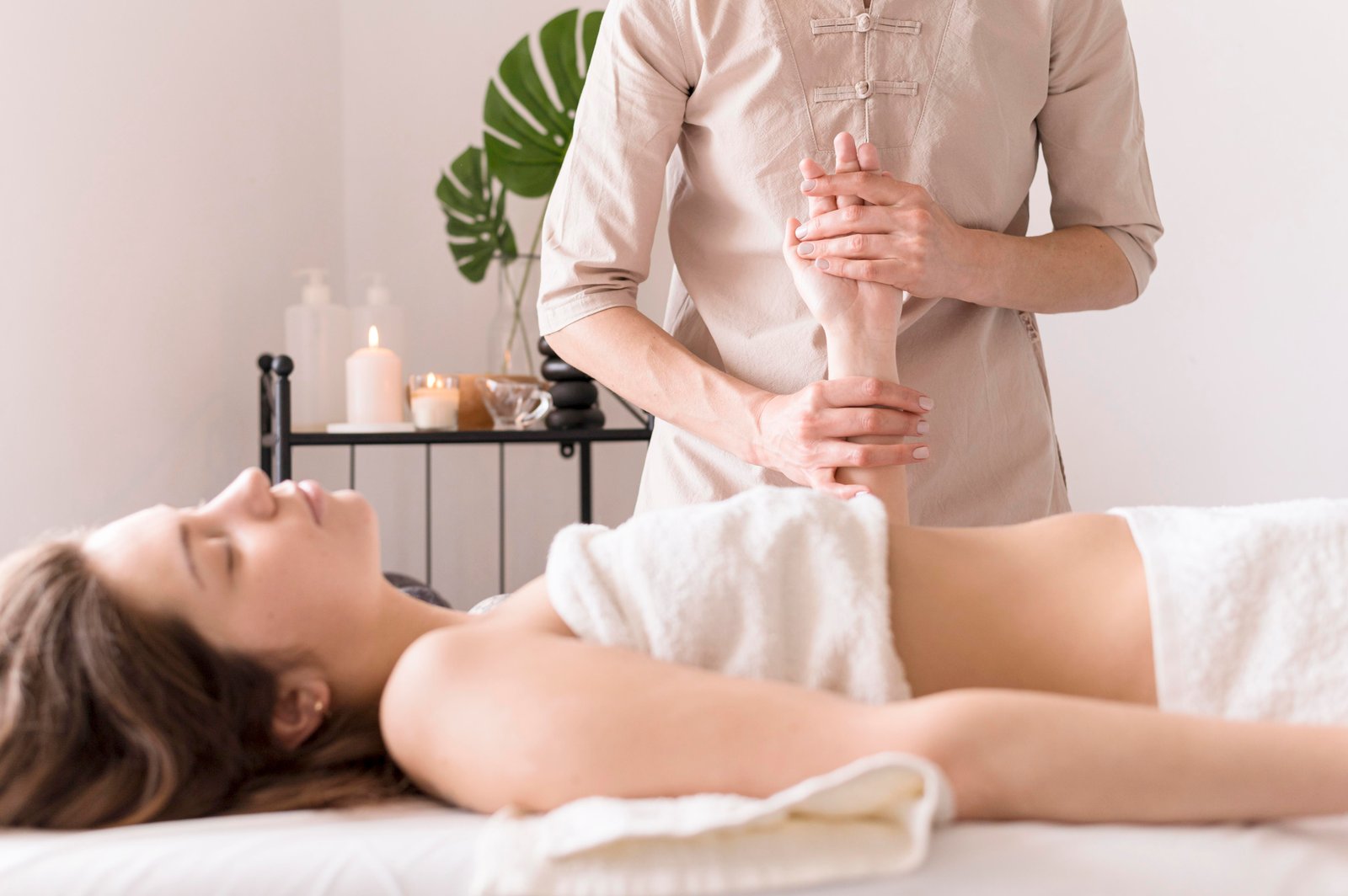Thai essential oil massage

Aromatherapy Massage A Holistic Journey to Relaxation
What Is Aromatherapy Massage?
Aromatherapy massage is a popular therapeutic practice in Thailand that combines muscle-relaxing techniques with the soothing power of natural scents. The essential oils used are often extracted from plants, herbs, and flowers, each offering unique benefits to restore balance to both the body and mind. This type of massage not only relaxes the body but also promotes inner peace, making it a gentle and safe option for holistic health care.
Why Is Aromatherapy Massage So Popular in Thailand?
Thailand is renowned worldwide for its diverse and intricate massage techniques. Aromatherapy massage blends traditional Thai practices with modern wellness knowledge, meeting the growing demand for holistic health solutions. With an abundance of herbs and plants, Thailand produces high-quality essential oils with distinctive, natural fragrances. Both locals and international tourists appreciate these oils for their therapeutic properties, solidifying Thailand’s reputation as a wellness hub.
The Role of Essential Oils in Everyday Life
Essential oils aren’t just for spas or massage centers; they play a significant role in daily routines. From home air freshening to creating a calming workspace, essential oils offer versatile applications. For example, lavender helps improve sleep quality and relaxation, while eucalyptus alleviates nasal congestion. Their diverse properties make essential oils indispensable for enhancing physical well-being and cultivating a tranquil environment.
A Blend of Tradition and Modernity
Aromatherapy massage isn’t merely about relaxation—it’s a bridge between traditional Thai health practices and globally recognized therapeutic techniques. This synergy has made Thailand a top destination for those seeking unique and authentic massage experiences.
The History of Aromatherapy Massage
Global Origins of Essential Oils
The use of essential oils spans thousands of years and is widely recognized for its benefits to both body and mind. Ancient civilizations like Egypt, Greece, Rome, India, and China have long embraced essential oils for purposes ranging from healing and religious rituals to skincare.
Egypt: Ancient Egyptians were pioneers in extracting oils from plants, using them in mummification, religious ceremonies, and health care. Oils like lavender and myrrh played a significant role in their culture.
Greece and Rome: These civilizations adapted Egyptian knowledge, utilizing essential oils for therapy, massage, and relaxation. Eucalyptus and rosemary were particularly favored.
India and China: In Asia, essential oils have been central to Ayurvedic and traditional Chinese medicine for centuries, with oils like tea tree and ginger used for various remedies.
During the Middle Ages, essential oils waned in popularity due to religious beliefs but experienced a revival during the Renaissance. In the 20th century, they became integral to aromatherapy, widely embraced as part of holistic wellness practices.
Aromatherapy massage continues to serve as a testament to the timeless connection between natural healing and modern well-being, drawing people worldwide to its soothing embrace.
Incorporation of Aromatherapy Massage in Thailand
Thailand is renowned for its unique massage culture, rooted in traditional Thai medicine. Aromatherapy massage was introduced to Thailand during the global rise of essential oil therapy. It was integrated with traditional Thai massage, which focuses on alleviating muscle and nerve pain.
The adoption began with the importation of popular essential oil blends from abroad, such as lavender and bergamot. Over time, Thai practitioners adapted these formulas to align with local culture and native herbs. For example, coconut oil was infused with lemongrass, while traditional Thai flowers like jasmine and orange jasmine were incorporated into aromatic blends.
Development and Cultural Adaptation in Thailand
To cater to both Thai clients and international tourists, aromatherapy massage in Thailand has evolved by combining traditional Thai therapeutic techniques with the natural fragrance of essential oils.
Local Natural Ingredients
The oils have been enhanced with Thai herbs such as bergamot, lemongrass, pandan leaves, and ginger.
Tailored Massage Techniques
The massage methods have been adjusted to provide greater relaxation, meeting the diverse needs of clients both domestically and internationally.
Ambience and Atmosphere
Aromatherapy massages in Thailand are often offered in tranquil spa settings featuring soothing background music and decor inspired by traditional Thai art.
This fusion of Thai herbs and global knowledge has transformed aromatherapy massage in Thailand into a distinctive experience. It also plays a vital role in elevating Thailand's health and wellness industry on the global stage.
What Are Essential Oils?
Definition and Characteristics of Essential Oils
Essential oils are highly concentrated extracts derived from plants, flowers, herbs, bark, or roots. They are known for their aromatic properties and therapeutic benefits. Each essential oil contains complex chemical compounds that provide unique effects, such as relaxation, improved focus, or relief from minor ailments.
Key Characteristics of Essential Oils
Volatile Liquids: They evaporate easily and are highly aromatic.
Distinctive Scents: Each oil has a characteristic fragrance reflective of its source plant or herb.
Color: Ranges from clear to pale yellow, with some oils exhibiting darker hues.
Therapeutic Properties: Includes antibacterial, anti-inflammatory, and calming effects.
Extraction Methods for Essential Oils
Essential oils are extracted using various techniques, including:
Steam Distillation: Commonly used for flowers and herbs.
Cold Pressing: Typically used for citrus peels.
Popular Essential Oils in Thailand
In Thailand, essential oils like lemongrass, bergamot, and jasmine are particularly popular, reflecting the integration of local culture and traditional herbs into modern aromatherapy practices.
This content has been structured to meet SEO standards with relevant keywords such as "aromatherapy massage," "essential oils in Thailand," and "Thai herbs in aromatherapy" for better visibility in search engines.
Aromatherapy Massage Techniques: A Comprehensive Guide for Relaxation and Healing
Aromatherapy massage is an art that combines the soothing scents of natural essential oils with gentle touch techniques. This practice focuses on relaxation, pain relief, and balancing the body and mind. Key techniques include:
Steps for an Aromatherapy Massage
Preparing the Space
Choose a quiet location with a comfortable temperature and warm lighting.
Enhance the atmosphere with scented candles or essential oil diffusers for a relaxing ambiance.
Set up a massage table, towels, and necessary equipment, such as support pillows.
Preparing the Client’s Body
Encourage the client to bathe or cleanse their body before the massage.
Recommend drinking water to support blood circulation during and after the session.
Preparing the Essential Oils
Select essential oils suited to the client’s needs, such as lavender for relaxation or eucalyptus for respiratory stimulation.
Mix the essential oil with a carrier oil (e.g., coconut oil or almond oil) for safe application.
Massage Procedure
Begin with warming up the body:
Rub warmed oil between your palms and gently apply it to the client’s body to stimulate blood flow.
Massage different areas of the body:
Back and shoulders: Use medium pressure and long strokes to release tension.
Arms and hands: Apply gentle squeezing and kneading, focusing on the palms and fingers.
Legs and feet: Massage from the thighs down to the feet to improve circulation.
Head and face: Use light pressure and strokes to alleviate stress.
Closing the Session
Finish with gentle strokes to conclude the massage.
Wipe off excess oil with a warm towel.
Allow the client to rest for a few minutes to fully relax.
Popular Aromatherapy Massage Techniques in Thailand
Effleurage (Long Strokes)
Gentle, long strokes help warm up the muscles, promote blood circulation, and relax tension.
Petrissage (Kneading and Squeezing)
This technique relieves muscle tightness and stimulates toxin removal from the body.
Acupressure
Pressing specific points balances energy flow, focusing on key areas like the lower back, shoulders, and feet.
Finger Strumming
Light finger movements release localized muscle tension and promote relaxation.
By combining these steps and techniques, aromatherapy massage provides a holistic experience that addresses both physical and emotional well-being. For enhanced SEO impact, ensure this guide is optimized with keywords such as aromatherapy massage, essential oils for massage, and Thai massage techniques to improve visibility and attract relevant readers.
Benefits of Aromatherapy Massage
Aromatherapy massage is more than just a relaxing activity; it offers numerous benefits for both the body and mind. The natural properties of essential oils, combined with the right massage techniques, promote overall well-being in several ways:
Physical Benefits
Relieves Muscle Tension
Aromatherapy massage helps alleviate muscle stiffness, especially in frequently used areas such as the neck, shoulders, and back.
Certain oils, such as peppermint oil and rosemary oil, have anti-inflammatory properties that help reduce muscle pain and swelling.
Improves Blood Circulation
The gentle stroking and pressing techniques used in the massage enhance blood and lymphatic circulation.
This helps the body eliminate toxins and waste more efficiently.
Nourishes the Skin
Carrier oils, such as almond oil or coconut oil, when combined with essential oils, provide deep hydration to the skin.
Oils like lavender and tea tree also have anti-inflammatory properties and help address skin issues.
Boosts the Immune System
Essential oils like eucalyptus and tea tree have antibacterial and antiviral properties, helping protect the body from infections.
Mental Benefits
Reduces Stress and Anxiety
The scent of essential oils such as lavender and chamomile helps lower cortisol levels, which are associated with stress.
The massage activates the parasympathetic nervous system, promoting calmness and relaxation.
Balances Mood
Oils like bergamot and rose stimulate positive emotions and help alleviate feelings of depression.
Enhances Sleep Quality
The aromas of essential oils such as lavender and sandalwood aid in regulating breathing and promoting deep sleep.
Improves Focus and Concentration
Essential oils like rosemary and lemon boost mental alertness and concentration.
Aromatherapy massage combines the therapeutic effects of touch with the holistic benefits of essential oils. Incorporating it into a wellness routine can significantly enhance physical and mental health, making it a popular choice for relaxation and self-care.
If interested, you can contact us at
LINE : similan98831
Email : similanmaiya@gmail.com
Phone number : +66 994-769-669
Copyright © Similan Thai Massage
 similan98831
similan98831 +66 994 769 669
+66 994 769 669 +66 994 769 669
+66 994 769 669 Click Now
Click Now

